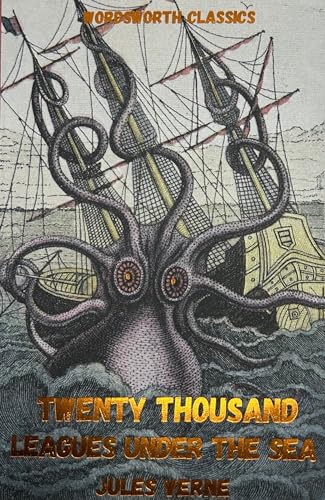20,000 Leagues Under the Sea (Wordsworth Classics)
Jules Verne
BOOK REVIEW

The depths of the ocean have always been a realm shrouded in mystery, a world both beautiful and terrifying. In 20,000 Leagues Under the Sea, Jules Verne plunges us into this enigmatic abyss, igniting a sense of wonder while exposing the darker essence of human ambition and curiosity. This classic tale, published in 1870, not only entertains but casts a glaring spotlight on humanity's relentless quest for discovery, often at the expense of the natural world.
Aboard the Nautilus, Captain Nemo embodies the spirit of exploration, yet he simultaneously represents the haunting reality of isolation and revenge. Driven by a profound disillusionment with the world above the waves, Nemo's submarine becomes a sanctuary and prison alike, where he commands the ocean's secrets. This tension between freedom and confinement will resonate with countless readers, prompting reflection on the choices we make in pursuit of our dreams.
Verne's storytelling is a masterclass in detail, painting vivid images of the underwater wonderland teeming with life. As you navigate through coral reefs, encounter colossal squids, and explore the remnants of shipwrecks, the narrative is infused with both scientific accuracy and poetic enchantment. These descriptions are not mere background scenery; they become characters in their own right, encapsulating the ocean's beauty and brutality. Readers often lose themselves in the breathtaking imagery and fascinating marine biology Verne presents, as he beckons them to witness the vivacity of an underwater world.
However, the novel's brilliance lies not just in its adventurous spirit but in its commentary on technological progress and imperialism. The time of Verne was marked by a race for innovation-the deep-sea exploration was seen as a frontier for national pride and progress. Captain Nemo's radical philosophy reflects the ambivalence of this age: the belief that humanity can conquer nature, yet the realization that such power comes with dire consequences. As tensions mount in the story, you cannot help but feel the weight of this dichotomy; it urges a contemplation of our own technological pursuits and ethical boundaries.
Reader comments often highlight the duality of experiencing sheer exhilaration alongside a creeping discomfort. Some celebrate the richness of Verne's imagination, while others critique the pacing of the narrative, arguing that certain explorative stretches could hinder the plot's momentum. Yet, isn't this very divergence a testament to Verne's genius? He compels you to ponder if the depth of the ocean-or any exploration, for that matter-truly lies in the destination or the journey itself?
Verne's impact extends beyond mere fiction; his work has influenced generations of writers, filmmakers, and thinkers. Notably, the work has inspired adaptations from iconic films to animated series, weaving its way into the cultural tapestry of storytelling. Authors from H.G. Wells to Stephen King have acknowledged the profound legacy of Verne, demonstrating that the questions he raised about humanity's relationship with technology continue to resonate today.
Engaging with 20,000 Leagues Under the Sea transcends the thrill of adventure; it invites you to grapple with existential dilemmas. It's a mirror reflecting our ambitions, fears, and aspirations. As you turn the pages, you immerse yourself not only in Verne's fantastical narrative but also in a broader discourse about the limits of exploration. Are we, like Captain Nemo, destined to swim alone in the vast sea of our pursuits, or can we forge deeper connections with the world around us?
In the end, this tale of twenty thousand leagues isn't merely a revelation of oceanic wonders; it's a profound plunge into the human psyche. As you delve into this literary masterpiece, allow the currents of Verne's words to sweep you into the depths, where every twist and turn reveals something not just about the world beneath the waves, but also about yourself. 🌊✨️
📖 20,000 Leagues Under the Sea (Wordsworth Classics)
✍ by Jules Verne
🧾 256 pages
1998
#20000 #leagues #under #wordsworth #classics #jules #verne #JulesVerne